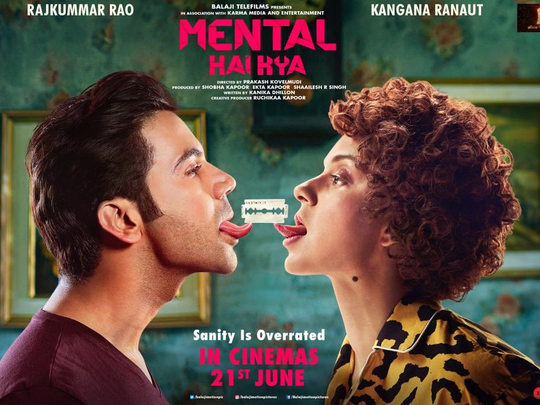
The film industry must be more sensitive to mental health issues, psychiatrists have said in response to the title and posters of upcoming Hindi film ‘Mental Hai Kya?’ (Are you mental?), featuring actors Rajkummar Rao and Kangana Ranaut.
A new poster depicts the stars trying to balance a razor blade between their tongues.
The Indian Psychiatric Society (IPS) on Thursday wrote to the Central Board of Film Certification (CBFC) raising concerns.
“We take serious objections to the title of the movie, which is discriminative, stigmatising, degrading and inhuman in projecting mental disorders and persons who suffer mental disorders. We strongly demand the title to be removed with immediate effect preventing further damage to the modesty of mental health service users,” read the letter.
The IPS demanded that the CBFC censor any sequence in the movie that violates the rights of people with mental disorders.
The poster of the movie, produced by Shobha Kapoor, Ekta Kapoor and Shaailesh Singh, written by Kanika Dhillon and directed by Prakash Kovelmudi, was launched recently with the caption: “Get ready for craziness that cuts through!”
A motion poster further reads: “This June, witness two mentals collide”, before breaking into a montage of images with the words “crazy, bizarre, crack, freaky, whacky, gutsy, weirdo, psycho”. The images showcase Ranaut making a cross-eyed face while Rao shows his two middle fingers.
Samir Parikh, director, Department of Behavioural Sciences and Mental Health, Fortis Healthcare, expressed dismay about how on one hand, a leading Bollywood actress like Deepika Padukone talked about her tryst with mental health issues and encouraged people to talk about it, while on the other hand, here’s a film like ‘Mental Hai Kya?’
“I have started a mental health curriculum, as part of which the idea is to tell children and teachers in schools about the importance of the right conversation about mental health in public. It plays a huge part in developing a perception about those fighting a mental health issue,” Parikh said.
He said it is vital that words like “psycho, schizo and mental” are not used in a dismissive way because people dealing with those issues then become apprehensive about seeking help.
“Besides, when a mainstream Bollywood film with such popular actors comes up with a title like ‘Mental Hai Kya?’, it is very unfortunate. We have to be very careful and sensitive about our messaging. Everyone should get a creative license, but not in the absence of social responsibility,” Parikh added.
“Bollywood has a major influence on our psyche and society,” said Milan Balakrishnan, consultant psychiatrist, Bombay Hospital and Masina Hospital Mumbai. “The representation of mental illness in the past by Bollywood has led to a lot of misinformation and stigma about the illness and its treatment.
“The representation of ECTs [electroconvulsive therapy] in films as a mode of punishment is something we have never been able to undo. Bollywood needs to now be more responsible and avoid increasing the discrimination that is meted out to people with mental illness.”
Social media was also abuzz with psychiatrists sharing their views about the need to bridge the gap in all aspects of mental health.
“The layperson would not be able to differentiate between ‘mentally ill’ and ‘mental’. Those with mental illness are often called ‘mental’ in a derogatory way,” tweeted one user.
Another wrote: “‘Mental Hai Kya?’ is a really bad title for a film. Sanity is not overrated and a person having mental health issues is not meant for your jokes and movie titles.”
Bollywood stars have spoken about mental health awareness and worked on projects related to it.
Padukone launched The Live Love Laugh Foundation (TLLLF) to develop outreach programmes to highlight the urgent mental health challenges that India faces.
On the big screen, Shah Rukh Khan and Alia Bhatt-led film ‘Dear Zindagi’ offered a departure from Bollywood’s stereotypical portrayal of mental illness, bringing the conversation into the mainstream.













